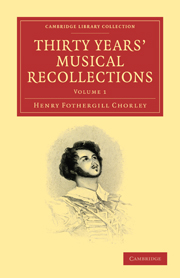THE YEAR 1840
Published online by Cambridge University Press: 29 August 2010
Summary
In 1840 the Opera management, which for half-a-dozen years had gone on from strength to strength, began to change its plans, and to show symptoms of uneasiness, decomposition, and pretext. Since the day when Signor Costa took up the baton, its orchestra had steadily improved under his discipline, intelligence, and resolution to be contented with nothing short of the best. Then, the excellent company of singers, who moved from Paris to London, with the rare advantage of perfect mutual understanding one with the other, had shown in their performances an equality and finish unattainable under any other circumstances than those of habitual intercourse. It is true, that new compositions did not come forward, as in the time when Signor Rossini was pouring out his treasures, no less fluently than, in his world, Walter Scott had done. But our public was well satisfied; and, for once in its life, knew that it was content, and asked for no immediate change.
The spell of ruin, in the shape of litigation, complicated enough to bewilder the most cunning Chancery (or Chicanery) barrister, had hung, for years on years, over the Haymarket Opera-House. Season after season had the world been wearied by reports of this or the other trial in which the property figured, as yet one more of those cases displayed by our admirable modern novelist in his “Bleak House.”—It would seem to be an indispensable ingredient in operatic speculation, that it should be entered on without money, without foresight, without special knowledge, by way of sheet-anchor.—To meet the exigencies of law and debt, prices of admission were raised ; the season (formerly dependant on subscription) was shortened;—and, what was least supportable, an attempt was made to replace the good artists by others less good.
- Type
- Chapter
- Information
- Thirty Years' Musical Recollections , pp. 175 - 186Publisher: Cambridge University PressPrint publication year: 2009First published in: 1862



